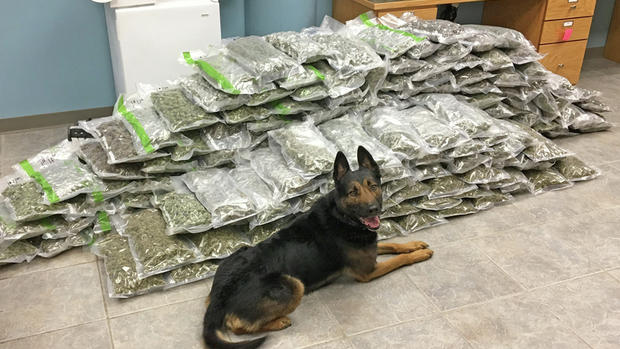Hunter Wilson of Growers Network details how cannabis legalization has not only helped the cannabis industry and its consumers, but also the police. Ending cannabis prohibition has opened up police resources to focus on crimes that actually harm people.

The following is an article produced by one of our authors. Growers Network does not endorse nor evaluate the claims of our contributors, nor do they influence our editorial process. We thank our contributors for their time and effort so we can continue our exclusive Growers Spotlight service.
One of the biggest arguments coming from proponents of cannabis prohibition is that cannabis is directly associated with violent crime1 and other illegal activities. You can clearly see this in how Attorney General Jeff Sessions talks about "marijuana":
I believe it would be unwise for Congress to restrict the discretion of the Department to fund particular prosecutions, particularly in the midst of an historic drug epidemic and potentially long-term uptick in violent crime. Jefferson Beauregard Sessions III
Jeff Sessions clearly believes that cannabis is associated with violent crime. But does the logic that hold up when scrutinized? Let’s take a look at some relatively recent studies examining the relationship between legalized cannabis and crime levels, and arrive at our own conclusions.
Border Security
The first study we shall look at is entitled “Is Legal Pot Crippling Mexican Drug Trafficking Organisations? The Effect of Medical Marijuana Laws on US Crime”, published on the 9th of June, 20172. In the journal, the authors explain that drug trafficking organizations (abbreviated as DTOs) are associated with violent crimes and other crimes near border regions, particularly in the American Southwest. In large part, many US border protection policies have been targeted at reducing the strength and effects that these DTOs have. Until recently, DTOs were one of the primary sources for cannabis in the United States, and had a firm control on the black market for cannabis.

It logically follows that if the US is producing its own cannabis now, and not relying upon DTOs for it, the price of cannabis should drop substantially. Profit margins for DTOs importing cannabis into the US should vanish. If the profit for cannabis is gone, naturally DTO activities should decline as well.
So what did the authors of the paper find? By examining Uniform Crime Reports (UCR) data and Supplementary Homicide Reports (SHR) data and controlling for plausible variations in DTO activity, they found that the implementation of Medical Marijuana Laws (Or MMLs) in states bordering Mexico were associated with “a strong reduction of 12.5% in the violent crime rate for counties close to the Mexican border. Moreover, within Mexican-border states we found that the strongest decrease in the violent crime rate occurs in counties in close proximity to the border while the effect weakens with the distance of a county from the border.”
The authors of the study also noticed a spillover effect as well. States that neighbored those with MMLs also saw a decrease in the violent crime rate near their borders.
Crime Clearance Rates
One metric of police effectiveness is denoted as “Crime Clearance Rates.” Essentially, the crime clearance rate is the ratio of crime cases that have been resolved to crimes cases that have been reported3. The higher the ratio, the better a law enforcement department or agency is at solving cases and prosecuting criminals. How the ratio is determined varies from agency to agency, so comparing agencies’ internal metrics is often the most valid method of determining improvements or declines.
In a study published on July 4th, 2018, authors found that legalization of cannabis resulted in no statistically significant decrease in crime clearance rates in states that legalized cannabis based on statistics in the UCR. Instead, they found that some crime clearance rates actually increased at a statistically significant rate4. Specifically, they found that:
- Arrest rates for cannabis possession declined. After legalization in 2012, possession arrests dropped nearly 50% in Colorado and more than 50% in Washington. (Editor’s Note: I feel like this was probably an obvious result of legalization)
- Violent crime clearance rates ticked up.
- Burglary and motor vehicle theft clearance rates "increased dramatically."
- Property crime clearance rates increased dramatically and reversed a gradual downwards trend in Colorado. 5
While the decline in arrests for possession should be an obvious result of legalization, the latter three clearance rate increases are particularly striking. Violent crime, burglary, motor vehicle theft, and property crime clearances rates all saw statistically significant increases. Colorado and Washington were states that, prior to legalization, were seeing downwards trends in their clearance rates for these crimes. With the sudden and full reversal on prohibition, there was also a sudden increase on clearance rates. While correlation does not imply causation, it should seem apparent that legalization has opened up police resources to pursue other crimes.
Knock-On Effects
One of the more interesting consequences of cannabis legalization though, is its effect on other crimes. According to a study by the University of Bologna in Italy (Editor’s Note: I know, I know, the University of Bologna. I had a good laugh too), several other measurements of criminal activity dropped dramatically after Washington legalized cannabis, and those same measurements also dropped in Oregon when it legalized cannabis two years later6.
Among some of the crimes you would expect to decline (such as criminal possession), other crimes and negative behaviors also decreased, including:
- Number of rapes went down. (by 15-30%)
- Property crimes dropped. (by 10-20%)
- Normal drinking and binge drinking diminished.
- Other drug usage also declined. 7
The only notable crime that increased was driving under the influence of cannabis, which is unsurprising as a direct consequence.
In Conclusion
Legalization is a positive outcome for the cannabis industry and its consumers. There is a direct benefit to legalization. But more importantly, there is a benefit to our society as a whole and law enforcement agencies can dedicate more resources to crimes that have victims.
Many critics of legalized cannabis have claimed that legalization will lead to an increase in crime, yet studies have shown the exact opposite. Why? I’ll leave you with some excellent hypotheses posited by the authors of the study from the University of Bologna:
- “First, cannabis use determines a variety of psychoactive effects, the most commonly reported one being a state of relaxation and euphoria. Thus, increased consumption of marijuana reduces the likelihood of engaging in violent activities.”
- “Second, this effect is reinforced if cannabis is a substitute for violence-inducing substances such as alcohol, cocaine and amphetamines. Studies generally find that marijuana and alcohol are substitutes. Our own results show that the legalization of recreational marijuana increased its consumption while reducing the consumption of other substances, including alcohol. These two channels may explain, in particular, the estimated drop in rapes. Consistent with this possibility, recent research shows that men consuming cannabis are less likely to engage in sexual aggression against their partners than men consuming alcohol.”
- “Third, the legalization of recreational marijuana may induce a reallocation of police efforts away from cannabis pushers and consumers and towards other types of offenses. Such reallocation of police effort may be reinforced by expectations, and therefore its effects on crime have arguably materialized before the actual opening of dispensaries and legal retail trade in WA following the 2012 vote. This would be consistent with detecting an impact on crime rates as soon as 2013-2014. This channel is consistent with a reduction of crime across the board.”
- ”Finally, the policy may have reduced the role for criminal gangs and small criminals in local cannabis markets. The legalization of recreational cannabis leads to the emergence of a legal market, which offers more safety and more reliable product quality via legitimate business. This likely drives illegal sellers out of the market. This mechanism fits recent empirical evidence that illegal markets are causally associated with crime and it may explain both the drop in rapes and thefts that we find. To be clear, we don’t know what previous dealers do after the legalization of the cannabis market, so this argument remains necessarily incomplete.”

References
- https://www.washingtonpost.com/news/wonk/wp/2017/06/13/jeff-sessions-personally-asked-congress-to-let-him-prosecute-medical-marijuana-providers/?utm_term=.da488050de74
- https://onlinelibrary.wiley.com/doi/full/10.1111/ecoj.12521
- Greene, Jack R. The Encyclopedia of Police Science. Routledge, 2007.
- http://journals.sagepub.com/doi/10.1177/1098611118786255
- https://www.sciencedaily.com/releases/2018/07/180724110031.htm
- https://www.sciencedirect.com/science/article/pii/S0167268118300386
- https://psmag.com/news/it-is-high-time-we-reduced-crime
10 Best Gift Ideas for Cannabis Connoisseurs and Growing Aficionados (2022)
December 7, 2022Developing and Optimizing a Cannabis Cultivation System
December 14, 2021Dealing with Insomnia: How Can CBD Help?
December 10, 2020Your Guide to Sleep and CBD
December 7, 2020
Do you want to receive the next Grower's Spotlight as soon as it's available? Sign up below!

Do you have any questions or comments?

About the Author
Hunter Wilson is a community builder with Growers Network. He graduated from the University of Arizona in 2011 with a Masters in Teaching and in 2007 with a Bachelors in Biology.